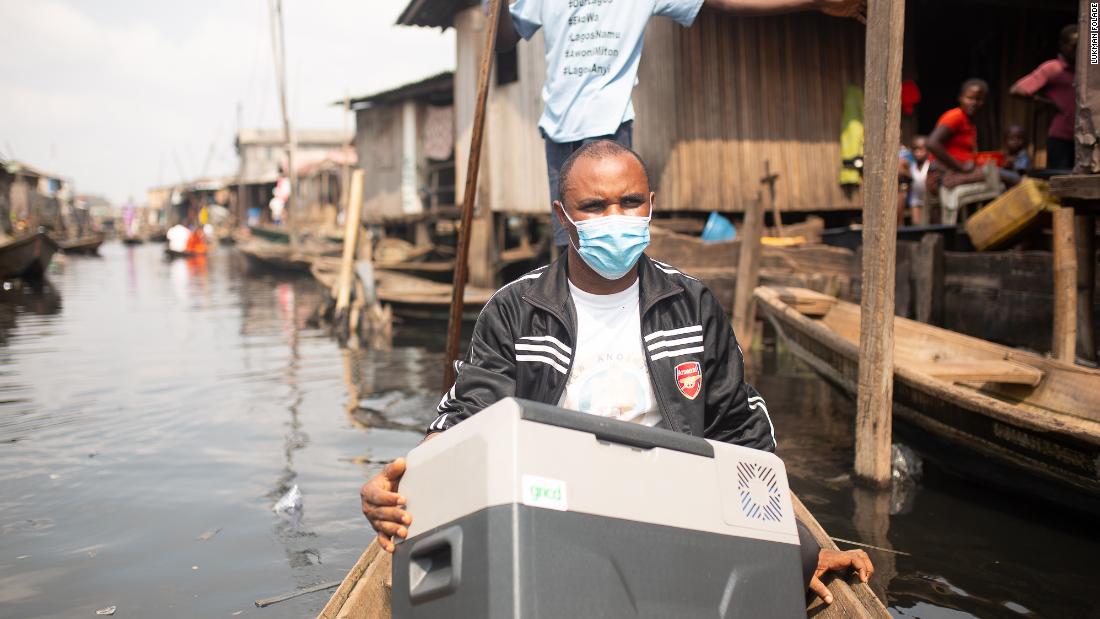Even if enough vaccines are secured, there is an enormous logistical challenge: how to transport temperature-sensitive vaccines to places without reliable electricity and refrigeration.
The answer lies in the development of a “cold chain” – a network of vehicles, refrigerators and cold rooms – that can be used to transport the vaccine smoothly, from the manufacturer to the point of immunization.
“We knew that we would have to transport billions of vaccines worldwide, to rural communities, and that we would need a temperature-controlled environment,” he adds.
The Pfizer-BioNTech vaccine should be kept at minus 75 degrees Celsius (minus 103 degrees Fahrenheit), while the Moderna vaccine can be kept at minus 20 degrees Celsius (minus 4 degrees Fahrenheit).
Even so, the existing cold chain networks will not be enough. Without new technology, up to 25% of vaccine supplies could be lost, says Peters.
Solar-powered cooling
This is where solar energy comes in, says Hugh Whalan, CEO of PEG Africa, a company that offers prepaid solar powered products to people in West Africa.
In preparation for a Covid-19 vaccination campaign, the company – with funding from Power Africa, a network of private and public groups created by USAid – has started providing solar energy systems to health clinics outside the network.
“Refrigerators need energy to work reliably to store vaccines safely, or else they will spoil. So we supply the energy, ”he told CNN.
Previously, PEG Africa’s cooling efforts focused on establishing a cold chain for food products, helping products reach the market without spoiling. It is currently testing prepaid solar freezers among fishermen in Ghana, Côte d’Ivoire and Senegal.
When the pilot finishes in the middle of this year, Whalan hopes to use the same financing and distribution infrastructure to deploy solar-powered refrigerators and freezers for health clinics and immunization points.
Of the two refrigerator suppliers PEG Africa works with, one has already received the performance, quality and safety (PQS) certification from the World Health Organization and the other is in the process of being acquired.
Reaching the last mile
Before a vaccine is administered to someone, they usually have to travel from the manufacturer to an airport, to a national vaccine store, to a provincial vaccine store, to a local health center and, finally, to the final location where it is given to a patient.
“The last mile is the biggest challenge and is where the biggest gap exists,” says Peters.
Gricd, a small Nigerian startup, hopes to help fill that gap. It is building solar-powered cold boxes to transport vaccines that can be kept at minus 20 degrees Celsius (minus 4 degrees Fahrenheit) and can be remotely controlled and monitored in real time.
The company claims to have worked with the National Center for Disease Control in Nigeria and the Nigerian Institute for Medical Research during the pandemic, helping to collect and transport Covid-19 test samples from remote areas. It has also entered into partnerships with private health companies in South Africa, Ghana and Egypt, says Oghenetega Iortim, the company’s founder.
The boxes vary in size from 15 to 100 liters, the smallest being capable of carrying around 200 doses of the vaccine. The 15-liter box was designed specifically for the “last mile” – the final stage of the trip.
“It can fit any existing means of transport, be it a boat, the back of a motorcycle, a bicycle or the back of a person,” says Iortim.
Since they work with solar-powered batteries – which maintain a stable internal temperature for up to a week – they are suitable for areas that are outside the grid, he adds.
They also contain a device that monitors location, humidity and temperature, and transmits this data to the distributor in real time.
“You get scared if something goes wrong – if the temperature drops suddenly or if there is a blackout – and you can take proactive measures to ensure that vaccines do not lose their potency,” says Iortim.
Although Gricd products have not yet received WHO PQS certification, Iortim says that cold boxes are in the process of certification. He adds that the product has been certified by the Nigeria Standards Organization.
Vaccinating on an unprecedented scale
But they focused on certain geographical areas or specific parts of the population, says Peters.
“What we haven’t done before is to try to vaccinate the whole world as quickly as possible,” he says.
He hopes that cold chain innovations for Covid-19 can produce broader long-term benefits and be applied to food and health.
“As we invest hundreds of millions of pounds in new equipment … are we designing a system to solve a problem today, or are we designing a system that has a lasting legacy?” he says.
